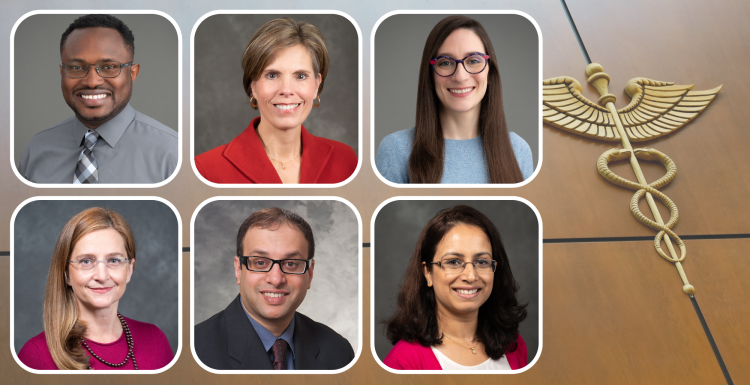In PHLITE School, Department of Medicine faculty hone their understanding of public health

Six Department of Medicine (DOM) faculty recently graduated from the Public Health Leadership in Teaching and Engagement (PHLITE) School, a seven-month program for clinical faculty at the UW School of Medicine and Public Health.
The program—described as a “mini fellowship”—consists of hour-and-a-half didactic sessions, with an overarching goal, explains Parvathy Pillai, MD, MPH, assistant professor of Population Health Sciences and faculty co-lead, “of developing clinical faculty skilled at promoting population health and teaching or mentoring learners to better integrate medicine and public health.”
In the first five sessions, subject matter experts present and lead discussions on the basics of population health, health equity and structural determinants of health, community engagement, advocacy, and the use of public health data. (A session on public health ethics will be added to the 2023-24 curriculum.)
During the program’s sixth and final session, faculty participants present independent explorations of community data done in the context of what they learned in previous sessions.
“I would describe my experience as a high-yield exposure to an overview of public health-related topics, as well as unique opportunity to take a step back and reflect on my teaching and clinical practice in a broader context,” says DOM participant Kerry Rees, MD, assistant clinical professor, General Internal Medicine.
“There have definitely been practical small changes that I have made based on the course, including refining the way I talk to my patients about race-based clinical decision calculators and incorporating the Center for Health Disparities Research [CHDR] Neighborhood Atlas tool into my small-group teaching with medical students.”
PHLITE is funded by the Path of Distinction in Public Health grant provided by the Wisconsin Partnership Program.
Learn more or apply for the upcoming cohort.
Banner. Top row, L-R: DOM PHLITE graduates Iliya Amaza, MBBS, assistant clinical professor, Allergy, Pulmonary and Critical Care Medicine; Jane Pearson, MD, associate clinical professor, Cardiovascular Medicine; Kerry Rees, MD, assistant clinical professor, General Internal Medicine. Bottom row, L-R: Aga Silbert, MD, associate clinical professor, Cardiovascular Medicine; Parag Tipnis, MD, associate clinical professor, Cardiovascular Medicine; Rachna Tiwari, MD, assistant clinical professor, Allergy, Pulmonary and Critical Care Medicine. Credit: Clint Thayer/Department of Medicine.